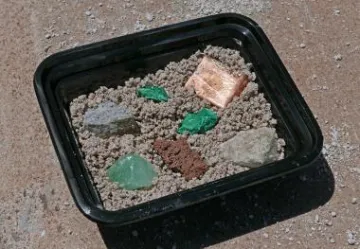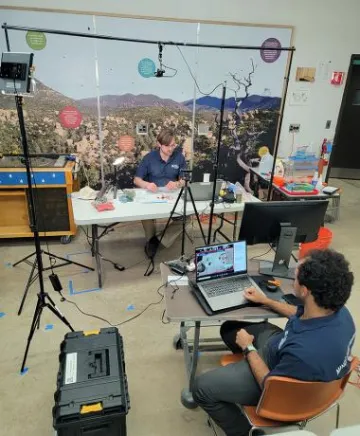Can you move an in-person Summer Engineering Academy (SEA) summer camp online and still provide students with a meaningful and memorable experience? On June 28th, 2021, during the livestreamed virtual Mining and Geological Engineering Day, the Lowell Institute for Mineral Resources and the Department of Mining and Geological Engineering (MGE) proved that you can.

A mineral kit in the making
Forty-seven students from 16 different states including Wisconsin, Florida, Washington, Ohio, Texas, California, and Arizona logged in ready for a day full of hands-on activities and interaction with UArizona professors and students. Activity kits prepared by the camp staff and sent out to students in the weeks before ensured that all student participants had hands-on access to the camp activities. “Live virtual events can be challenging, but with the excellent framework put in place by the College of Engineering, the great presentations from the MGE faculty and students, and the great work by SEA counselor team, the day went very well,” said Chris Earnest, Education Outreach Coordinator.
The activities for the day were organized along the life cycle of a mine, from discovery to reclamation. Students dug out and identified their own mineral samples from a mineral dig kit while learning how we use those minerals every day. Dr. Muhammad Waqas introduced to mine planning and the students analyzed a simple block model to design their own mine. “I really liked the mine planning activity. Although it was a simplified version of what an engineer does, it was easy to understand and was fun to do,” one participant said, describing her favorite activity of the day. To learn more about how a mine operates, Assistant Director James Werner took the students on virtual a tour of the San Xavier Mining Laboratory and showed them the many opportunities available for students.

Chris Earnest and John Gengler in the studio
Students learned how engineers work to keep miners safe as Gillian Noonan, from the Geotechnical Center of Excellence, introduced them to geotechnical engineering and an activity to analyze thermal imaging data to detect rockfalls in a mine. Max Drexler, a graduate student from the MGE department took campers by surprise when he asked them toto crush a malachite sample from their mineral kit and dissolve it in vinegar to demonstrate principals of hydrometallurgy.
The day ended on the final step in the life cycle of a mine. Dr. Brad Ross showed students the importance of sustainable resources development and how engineers must consider many different environmental and social situations in all phases of mining. The students were able to apply these sustainability principals in a live mine reclamation activity during which they were tasked with balancing the needs of various stakeholders while making decisions about how to design a miner reclamation plan. After the activity one camp participant said, “I learned that engineers need to get different viewpoints about their ideas to make sure they are making the right decisions.”
Increasing awareness of mining and mineral resources
Students rated their knowledge of mining before and after the day’s activities, showing a substantial increase. "Even in the virtual modality, it is great to see these results because it shows us that we can indeed raise awareness about a field that typically doesn’t get as much attention as some other better-known disciplines. Events like this show students just how interesting mining is and can ultimately be the spark to launch a career in the field,” said Mario Muñoz, Recruitment Outreach Coordinator for the Lowell Institute for Mineral Resources and facilitator of the event.
With this experience as a guide, the Lowell Institute Outreach Team is looking forward to applying the lessons learned during this year’s virtual camp to next summer’s SEA 2022.

The Lowell Institute for Mineral Resources would like to thank graduate student Max Drexler for taking time out of his summer internship to present to the camp, the camp counselors for their hard work engaging camp participants, the kit assembly team for their help assembling the experiment kits, intern John Gengler for running the livestream, and especially CJ Smith, Recruitment and Outreach Coordinator for the College of Engineering, for creating a great framework that enabled such a smooth transition to a virtual camp.

